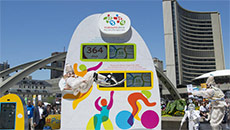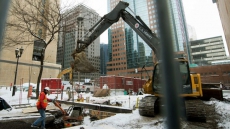VANCOUVER — A long and dark list materializes when tabulating the health problems plaguing First Nations communities across Canada: HIV and AIDS, tuberculosis, nutritional deficits, alcohol and drug dependency, suicide.
Some innovative thinkers say they believe a brilliant solution could cost as little as $25,000.
An accounting firm and new tech outfit have paired to try to inspire problem-solvers from around the world to generate cost-effective ideas that might prove to be the magic elixir for the health care challenges facing First Nations.
MNP LLP has adopted a strategy that's also being used by Google as it tries to send a robot to the moon — combining crowd-sourcing and cash incentives to find solutions.
"Everybody will say, 'Let's throw more money at this problem,'" said Clayton Norris, an executive with the Calgary-based MNP. "But that's not what we're saying here."
The firm is putting up just $25,000 as first prize, and two smaller prizes of $5,000, for the best ideas that will be judged by a panel of health experts and its own representative. The challenge is dubbed "Operation Blue Sky."
First Nations health advisors say the avant-garde use of crowd-sourcing, referring to the process of soliciting a multitude of micro-ideas using the expansive reach of 21st century communications, is a first for aboriginal healthcare in Canada.
Finding an affordable way to address the many health problems faced by First Nations is a big ask, Norris admitted. But his firm was inspired to try something different by the online platform that's hosting the challenge.
The company, called HeroX, is a for-profit spinoff of the XPrize Foundation, which is running Google's higher-stakes $30 million competition urging teams to design a cheap lunar robot by the end of 2016.
"It's a bit of a leap of faith for us. Because, what can we do? We see firsthand the challenges in the community," Norris said. "Maybe if we can spur some change or find out about something really good that's happening in another region in Canada, or in a tribal organization in the U.S., or Australia or New Zealand.
"Maybe it's just a very basic idea that can benefit as many people as possible."
Norris said the competition stems from MNP's desire to give back to its clients — more than 150 First Nations across the country. The deadline for proposals is Aug. 12.
Anyone can submit a solution, although the firm is encouraging entries from aboriginal Canadians who already have some experience providing community healthcare. MNP funds the prize, while also paying a small percentage to HeroX.
Crowd-sourcing solutions to the native health dilemma has potential to produce profound results, said HeroX vice-president Emily Fowler. She points to the invitation for aboriginal people to participate, rather than be merely subjected to another plan imposed from the outside.
"It's a matter of taking on something that could be seen as touchy, or debatable, or contentious. It's about saying, 'Let's put aside any of that, let's create something together by sourcing those ideas together.'"
The MNP challenge has already been distributed to a network of 800 people via the First Nations Health Managers Association, said its executive director Marion Crowe.
Solutions could be as simple as designing a community garden combating the higher instances of diabetes charted in native youth, she said.
"We don't have to invest a million dollars in telehealth technology," she said. "Crowd-sourcing hasn't been done in aboriginal health. Just doing this is innovation itself."
Chief Medical Officer Dr. Evan Adams, with B.C.'s First Nations Health Authority, urged "sophisticated" proposals showing a clear understanding of the complex issues.
"For us, it is very colonial when people say, 'Oh, you know what you Indians need to do? You need to eat your vegetables, so let me start up a program where we teach your kids,'" he said.
"A very evolved conversation would be. ... We can work together. Rather than me coming in like a superhero, helicoptering in and telling all of you how to live your lives, let's decide together."





